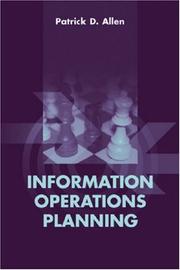| Listing 1 - 3 of 3 |
Sort by
|

ISBN: 1580535232 9781580535236 9781580535175 1580535178 Year: 2007 Publisher: Norwood, MA Artech House
Abstract | Keywords | Export | Availability | Bookmark
 Loading...
Loading...Choose an application
- Reference Manager
- EndNote
- RefWorks (Direct export to RefWorks)
Information operations involve the use of military information and how it is gathered, manipulated, and fused. It includes such critical functions as intelligence, surveillance, reconnaissance, command and control, communications, and precision navigation. Separating myth from reality, this authoritative resource provides military professionals with a current and comprehensive understanding of information warfare operations planning, including offensive, defensive, and influence operations. The book identifies the features of information operations that differ from traditional military operations and reveals why this discipline is more important now than ever before. Professionals discover new planning tools that have been brought together under a single platform to become the next Information Operations Planning Tool for the U.S. Department of Defense. Additionally, the book defines identifies new threats and opportunities, and explains why the U.S. is not yet winning the war for the minds.
Information warfare. --- Information warfare --- Military planning. --- War planning --- Military administration --- Military policy --- Planning --- Military art and science
Book
Year: 1992 Publisher: Santa Monica, CA : RAND Corporation,
Abstract | Keywords | Export | Availability | Bookmark
 Loading...
Loading...Choose an application
- Reference Manager
- EndNote
- RefWorks (Direct export to RefWorks)
Recent and rapid changes in the world have led to a reexamination of a number of national policy issues. This report focuses on the issue of the current and projected U.S. dependence on strategic materials from southern African nations. The authors conclude that the United States is very dependent on two materials (chromium and cobalt) and somewhat dependent on three other materials (manganese, platinum group metals, and vanadium) obtained from southern African nations. The article also briefly discusses four hedging options against these dependencies: purchasing and stockpiling strategic materials, industrial incentives, research into alternative sources for these materials, and research into alternative materials.
Strategic materials --- Nonferrous metal industries --- Nonferrous metal industries --- United States --- United States --- Africa, Southern --- Armed Forces --- Supplies and stores. --- Foreign economic relations --- Foreign economic relations
Book
Year: 1994 Publisher: Santa Monica, CA : RAND Corporation,
Abstract | Keywords | Export | Availability | Bookmark
 Loading...
Loading...Choose an application
- Reference Manager
- EndNote
- RefWorks (Direct export to RefWorks)
Use of the Global Positioning System (GPS) can enhance the navigation of combat platforms and the guidance of munitions. This report presents a design for incorporating GPS into RAND's theater-level combat or nonlinear combat (TLC/NLC) model, which is used for policy analysis of military operations. The author's design looks first at GPS coverage, i.e., how position is located using one or more GPS satellites. Next, the author considers factors limiting the access of GPS-equipped assets to the system. Third, the author examines the benefits to assets so equipped: improved self-location accuracy, which enhances navigation and reduces fratricide; improved target location accuracy; and improved targeting of stand-off munitions. The final consideration is countermeasures against threats to GPS transmitters, receivers, and signals.
| Listing 1 - 3 of 3 |
Sort by
|

 Search
Search Feedback
Feedback About UniCat
About UniCat  Help
Help News
News